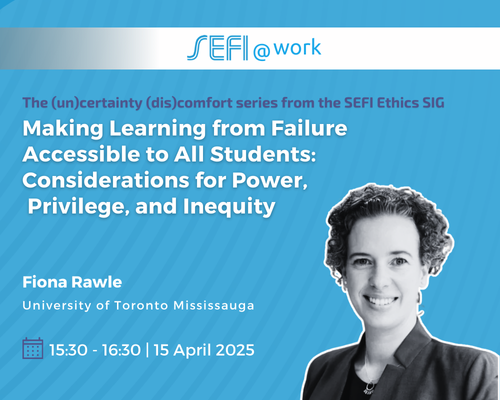Dear Members and Partners, We are pleased to share with you SEFI’s Strategic Plan for…
Kristin Winkens from RWTH Aachen Germany on Resilience with Neil Cooke and Natalie Wint

Discussion around the need for engineers to navigate increasingly complex and uncertain challenges (e.g., climate change, digitalisation) features heavily within engineering education research and leads to questions pertaining to the abilities of engineering graduates. Despite this, little is known about the way in which engineering programmes support students in coping with such uncertainty and complexity (also referred to as resilience).
In this episode we spoke to Dr. Ann-Kristin Winkens, a postdoctoral researcher in the Gender and Diversity in Engineering Research Group (GDI) at RWTH Aachen in Germany. Ann-Kristin draws upon her prior education in environmental engineering when researching areas of systems resilience and competencies needed when designing resilient systems.
The rest of the article summarises some of the key discussion points:
Defining resilience
Ann-Kristin explains that resilience can be defined differently depending on the context and that her work considers systems resilience meaning the resilience of complex systems, such as infrastructure, to adverse events such as natural hazards. She also tells us that resilience shouldn’t be confused with other concepts such as bouncing back or robustness, which would involve returning to the initial state as opposed to building back better by learning and adapting, which is the case for resilience.
The systematic literature review
Ann-Kristin describes the findings of her systematic literature review in which she found engineering education to address resilience on two levels: an individual level, as a personal attribute, and at a systems level, referring to the ability of engineering students to design resilient systems. The former level considers stress and failure during study, whereas most publications focused on the latter level spoke of natural hazards. The review identified a gap in literature focused on the integration of systems resilience into curricula.
She explains that one of the most interesting findings of the literature review was that few studies provided a definition or explanation of resilience, something which limits the value of discourse on resilience in engineering education.
The importance of resilience
Ann-Kristin claims that systems resilience is important because we live in a VUCA (volatile, uncertain, complex, ambiguous) world with an increasing likelihood of the occurrence of extreme events. This means that we should plan for the possible, as opposed to the probable, in designing resilient infrastructure which is resilient to natural hazards. The unknown challenges, problems and risks that engineers will be confronted with necessitates a change in methods and solutions and thus the competencies addressed by engineering education.
The competencies involved
Ann-Kristin describes the development of a conceptual framework for defining and characterising resilience related competencies which include systems thinking (the ability to recognise interactions and interdependencies), the ability to anticipant future scenarios (what could go wrong?) and learning from failure. She explains that many of these competencies appear in other part of engineering programmes, but that the combination of competencies together in a specific context, is needed to enable students to design resilient systems.
Are the resilience related competencies addressed in European engineering programmes?
Ann-Kristin describes a study in which she focused on the inclusion of resilience related competencies in the learning outcomes of master’s degree courses at five major technical universities. She found that few study programmes contained reference to any of the resilience related competencies and that only one had a learning outcome which explicitly included the term ‘systems resilience’.
In terms of competencies, she found that most study programmes contained learning outcomes which referred to dealing with complexity, namely complex problem solving, as well as systems thinking. In comparison, anticipation was only addressed once. Ann-Kristin concludes by recommending the formulation of explicit, differentiated learning outcomes.
Resilience and accreditation
Ann-Kristin explains that accreditation can be considered to serve as a blueprint for learning and outcomes of programmes, and that analysis of accreditation criteria (namely ABET, EUR-ACE, CDIO) thus appeared a logical next step when trying to identify reasons for the absence of resilience-related concepts in teaching and curricula. All three reference frameworks emphasized solving complex problems as a key element of engineering education. EUR-ACE addressed some competencies, which, based on the work focused on universities, was not considered to have trickled down to programme level learning outcomes. The CDIO Syllabus was found to provide an extensive coverage of resilience-related competencies including dealing with complex systems under uncertainty, but also explicitly and repeatedly addresses anticipatory competencies and learning (from failure), which are necessary competencies for designing resilient systems.
Teaching practice
Ann-Kristin advocates for creating an open culture for failure and integrating a learning habit of mind that reflects that learning from failure is important within engineering. She stresses the need to connect the resilient related competencies as opposed to having them scattered through a programme. Acquisition of these competencies can then be assessed in several different ways. For example, Ann-Kristin mentions the use of pre-post self-perception surveys as well as reflective diaries.
She also describes providing students with an opportunity to develop a resilience related case study concerning a past disaster which involves analysis of the crisis with regard to resilience. She then asks questions such as ‘did they understand the concept of resilience’, ‘did they consider the system boundaries and interdependencies’, ‘have they derived and implications for further learning from the crisis’. She explains that utilising a variety of assessment methods or approaches is important in gathering a holistic view on competency development.
Future research in the area
Ann-Kristin speaks of wanting to expand her analysis to study programmes globally, as well as the need to address concerns around scalability.
Takeaways
Ann-Kristin encourages us to focus on the type of resilience we want to address or develop and to read her systematic literature review to get an insight into the variety of ways the term is used within engineering education.
Resources:
This paper describes the development of a conceptual framework to define and categorize resilience-related competencies (e.g., flexibility, adaptability, dealing with uncertainty) in engineering education.
Winkens, A.-K., & Leicht-Scholten, C. (2021). Resilience as a key competence in engineering education – development of a conceptual framework. European Society for Engineering Education (SEFI). https://www.sefi.be/wp-content/uploads/2021/12/SEFI-Annual-Conference-2021-Blended-Learning-in-Engineering-Education.pdf.
This paper presents, compares and discusses teaching and learning activities addressing VUCA and resilience, occurring at different curriculum levels.
S. Rouvrais, A. Winkens, C. Leicht-Scholten, H. Audunsson, C. Proches (2023). VUCA AND RESILIENCE IN ENGINEERING EDUCATION – LESSONS LEARNED. 312-322. 2023 19th International CDIO Conference, NTNU, Norway. http://ww.cdio.org/knowledge-library/documents/vuca-and-resilience-engineering-education-%E2%80%93-lessons-learned.
This paper describes an investigation into whether resilience related competencies are addressed within engineering study programs, this involving a content analysis of the learning outcomes from 48 study programs of five leading technical universities in Europe.
Ann-Kristin Winkens & Carmen Leicht-Scholten (2023) Competencies for designing resilient systems in engineering education – a content analysis of selected study programs of five European technical universities, European Journal of Engineering Education, 48:4, 682-706. https://www.tandfonline.com/doi/full/10.1080/03043797.2023.2179913.
This paper describes a systematic literature review of 67 research articles, aimed at clarifying meanings, definitions and applications of resilience within engineering education.
Ann-Kristin Winkens & Carmen Leicht-Scholten (2023) Does engineering education research address resilience and if so, how? – a systematic literature review, European Journal of Engineering Education, 48:2, 221-239. https://www.tandfonline.com/doi/full/10.1080/03043797.2023.2171852.
This paper describes an exploration of the extent to which resilience-related competences are included in accreditation guidelines and frameworks such as ABET, EUR-ACE and the CDIO Syllabus.
Winkens, A.-K., Engelhardt, F., & Leicht-Scholten, C. (2023). Resilience-Related Competencies In Engineering Education – Mapping Abet, Eur-Ace And Cdio Criteria. European Society for Engineering Education (SEFI). DOI: 10.21427/B7ZX-QS66.https://arrow.tudublin.ie/cgi/viewcontent.cgi?article=1005&context=sefi2023_respap.

